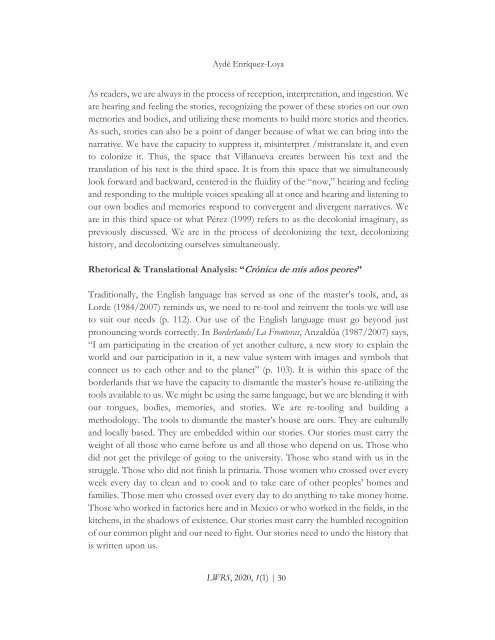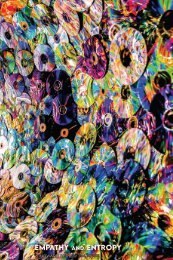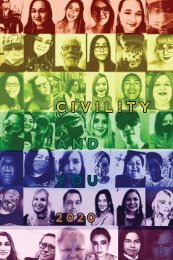LWRS June 2020 Volume 1, Issue 1
Inaugural Issue co-edited by Yndalecio Isaac Hinojosa and Isabel Baca
Inaugural Issue co-edited by Yndalecio Isaac Hinojosa and Isabel Baca
You also want an ePaper? Increase the reach of your titles
YUMPU automatically turns print PDFs into web optimized ePapers that Google loves.
Aydé Enríquez-Loya<br />
As readers, we are always in the process of reception, interpretation, and ingestion. We<br />
are hearing and feeling the stories, recognizing the power of these stories on our own<br />
memories and bodies, and utilizing these moments to build more stories and theories.<br />
As such, stories can also be a point of danger because of what we can bring into the<br />
narrative. We have the capacity to suppress it, misinterpret /mistranslate it, and even<br />
to colonize it. Thus, the space that Villanueva creates between his text and the<br />
translation of his text is the third space. It is from this space that we simultaneously<br />
look forward and backward, centered in the fluidity of the “now,” hearing and feeling<br />
and responding to the multiple voices speaking all at once and hearing and listening to<br />
our own bodies and memories respond to convergent and divergent narratives. We<br />
are in this third space or what Pérez (1999) refers to as the decolonial imaginary, as<br />
previously discussed. We are in the process of decolonizing the text, decolonizing<br />
history, and decolonizing ourselves simultaneously.<br />
Rhetorical & Translational Analysis: “Crónica de mis años peores”<br />
Traditionally, the English language has served as one of the master’s tools, and, as<br />
Lorde (1984/2007) reminds us, we need to re-tool and reinvent the tools we will use<br />
to suit our needs (p. 112). Our use of the English language must go beyond just<br />
pronouncing words correctly. In Borderlands/La Fronteras, Anzaldúa (1987/2007) says,<br />
“I am participating in the creation of yet another culture, a new story to explain the<br />
world and our participation in it, a new value system with images and symbols that<br />
connect us to each other and to the planet” (p. 103). It is within this space of the<br />
borderlands that we have the capacity to dismantle the master’s house re-utilizing the<br />
tools available to us. We might be using the same language, but we are blending it with<br />
our tongues, bodies, memories, and stories. We are re-tooling and building a<br />
methodology. The tools to dismantle the master’s house are ours. They are culturally<br />
and locally based. They are embedded within our stories. Our stories must carry the<br />
weight of all those who came before us and all those who depend on us. Those who<br />
did not get the privilege of going to the university. Those who stand with us in the<br />
struggle. Those who did not finish la primaria. Those women who crossed over every<br />
week every day to clean and to cook and to take care of other peoples’ homes and<br />
families. Those men who crossed over every day to do anything to take money home.<br />
Those who worked in factories here and in Mexico or who worked in the fields, in the<br />
kitchens, in the shadows of existence. Our stories must carry the humbled recognition<br />
of our common plight and our need to fight. Our stories need to undo the history that<br />
is written upon us.<br />
<strong>LWRS</strong>, <strong>2020</strong>, 1(1) | 30





